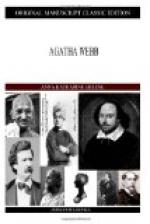“Well reasoned!” murmured Abel, expecting the others to echo him. But, though Mr. Fenton and Dr. Talbot looked almost convinced, they said nothing, while Knapp, of course, was quiet as an oyster.
Sweetwater, with an easy smile calculated to hide his disappointment, went on as if perfectly satisfied.
“Meanwhile John awakes, sees the dagger, and thinks to end his misery with it, but finds himself too feeble. The cut in his vest, the dent in the floor, prove this, but if you call for further proof, a little fact, which some, if not all, of you seem to have overlooked, will amply satisfy you that this one at least of my conclusions is correct. Open the Bible, Abel; open it, not to shake it for what will never fall from between its leaves, but to find in the Bible itself the lines I have declared to you he wrote as a dying legacy with that tightly clutched pencil. Have you found them?”
“No,” was Abel’s perplexed retort; “I cannot see any sign of writing on flyleaf or margin.”
“Are those the only blank places in the sacred book? Search the leaves devoted to the family record. Now! what do you find there?”
Knapp, who was losing some of his indifference, drew nearer and read for himself the scrawl which now appeared to every eye on the discoloured page which Abel here turned uppermost.
“Almost illegible,” he said; “one can just make out these words: ’Forgive me, James—tried to use dagger—found lying—but hand wouldn’t—dying without—don’t grieve—true men—haven’t disgraced ourselves—God bless—’ That is all.”




